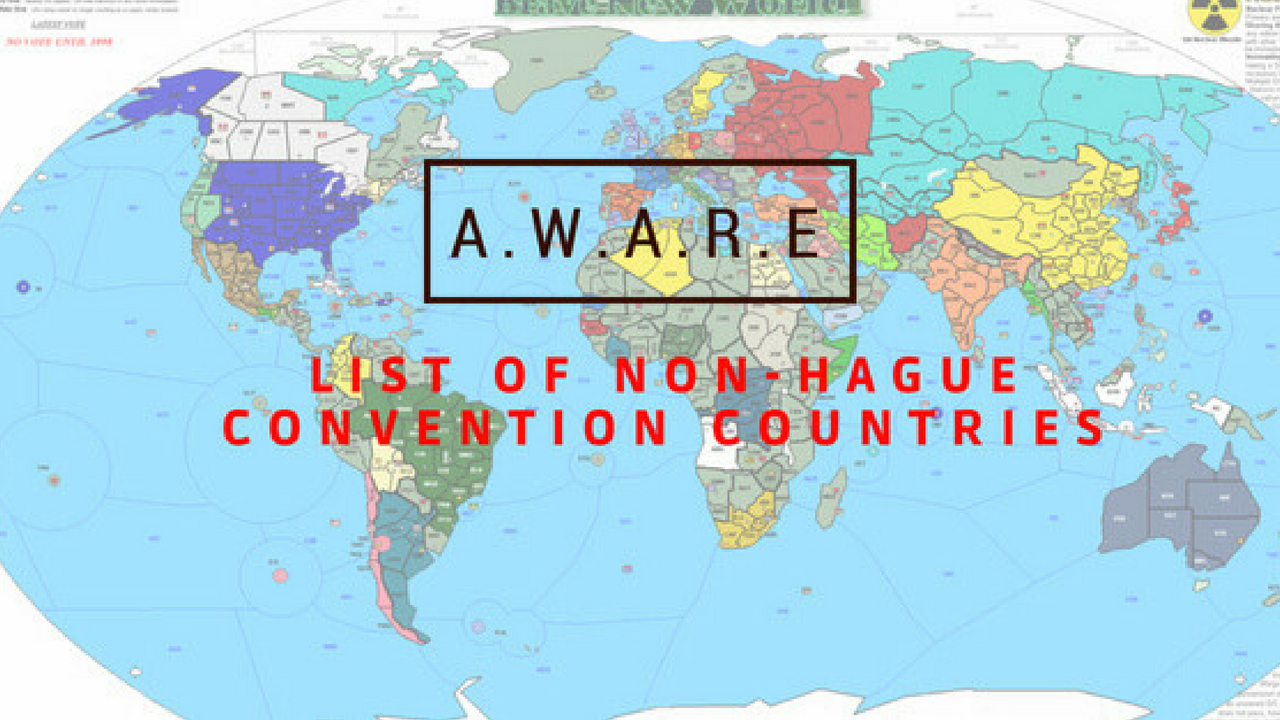When authenticating your long-form birth certificate, it’s important that you choose a country that is not part of the Hague Convention. In other words, choose a non–hague country.
What is the Hague Convention?
The Hague Convention is a treaty signed by numerous countries to establish a standard procedure for international child abduction cases. A “Hague case” refers to a case involving the abduction of a child from one Hague country to another. The Treaty of the Hague Convention ensures that the protections of children are treated fairly.
A “non-Hague case” refers to a case involving the abduction of a child from a non-Hague country to a Hague country, or from one non-Hague country to another non-Hague country. In these cases, there is no standard international procedure for resolving the matter, and it must be handled through the domestic courts of the countries involved.
In addition, the treaty represents a commitment by participating countries to prioritize the best interests of children in intercountry adoptions and to prevent child abduction, exploitation, and trafficking. The Hague Convention aims to promote cooperation between countries in intercountry adoption matters and to ensure that adoptions are carried out in an ethical and transparent manner.
The provisions of the treaty focus on ensuring that intercountry adoptions are carried out in a manner that respects the rights of both the child and the birth parents, and that such adoptions are not motivated by profit. Through the Hague Convention, participating countries are working together to provide a legal framework for intercountry adoptions that prioritizes the welfare and protection of children.
The History of the Hague Convention
The Hague Convention on the Protection of Children and Co-operation in Respect of Intercountry Adoption (often referred to simply as the Hague Adoption Convention) is a treaty signed by numerous countries to establish a standard procedure for international child adoption cases. It was created by the Hague Conference on Private International Law, an intergovernmental organization based in The Hague, Netherlands, in 1993.
The treaty was created in response to concerns about the increasing number of child abductions, as well as the exploitation of children and families in international adoption processes. The Hague Adoption Convention was designed to provide greater protection for children, birth parents, and adoptive parents by establishing a legal framework for inter-country adoptions and promoting cooperation between countries.
The Hague Adoption Convention has been ratified by over 100 countries, and it is widely recognized as the leading international instrument for regulating inter-country adoptions. Its provisions aim to ensure that adoptions take place in the best interests of the child, that they are not motivated by profit, and that they are carried out with due regard for the rights of birth parents and the child.
Why It’s Important to Choose a Non-Hague Country To Authenticate
Choosing a non-Hague country is important because it means these countries recognize apostilled and authenticated certificates and makes your Certificate of Live Birth (COLB) easier to use while traveling abroad. It is important to authenticate a birth certificate in a non-Hague country because, in the absence of an international treaty like the Hague Convention, there may be no established procedure for recognizing foreign legal documents. This can lead to difficulties in proving the identity and citizenship of a person, as well as difficulties in establishing legal rights and obligations related to matters such as child custody, adoption, immigration, and inheritance.
So, when authenticating your long-form birth certificate (Certificate of Live Birth), it’s important that you choose a country that is not part of the Hague Convention. In other words, choose a non–hague country.
Provided below is a list of countries that are part of the Hague Convention and countries that are not a party to the convention. Reference it when authenticating your birth certificate.
Hague Convention Countries
The Hague Legalization Convention IS in force in the following countries.
|
|
|
Non-Hague Convention Countries
The below countries are NOT a party to the Convention. Thus, need “Embassy (Consular) Legalization” ( “Chain Authentication”).
|
|
|
Please feel free to share this post with others!
Source: Apostille.Us








If a living soul picks a non Hague are there any problems with picking a certain one?
Good Day! When filing the Apostille COLB in a Non Hague Country, would i be granted a Passport of that country? Automatic citizenship? Other Benefits? I am thinking Vietnam.
I like what you are doing.
Regards,
Josef Vogel
No
Morocco became a Hague convention country in 2015. The list needs to be updated. Just fyi.
Thank you. Our research team will make sure the list is up to date. 🙂
Good day,
so if I’m from Poland but I’m living in China to legalize my birth certificate I should choose China, and get things done with my embassy?
Canada is now on the list of Hague countries since January
Thanks for sharing! We’ve just added Canada to the Hague Convention list. We’re always looking to improve our list so if there is another country that should not be there, do let us know.
Peace and blissings!
I love the information that is proviided
Now l know the difference between the B.Certificate and the C.O.L.B. ( Certificate Of Live Birth ). The latter is “after” the B.C. has gone through the authentication process.😏
You’re very welcome 🙂
(And Hati and Iraq have signed parts and are in process of becoming a member. This is really important to keep updated as people are depending on this kind of information to spend money and authenticate documents to better their lives. This list should be cross referenced at *least* monthly with hcch.net.)
Greetings, Lanka,
Thanks so much for your comment. We agree with you and appreciate you sharing your feedback here. We strive to ensure that all of the information we post and share is up to date and ensure that anything outdated is corrected right away. We know that at any given time, a country can become part of the Hague convention so we know how important it is to have this list up to date. We are on top of this and will make the necessary changes.
Thanks so much!